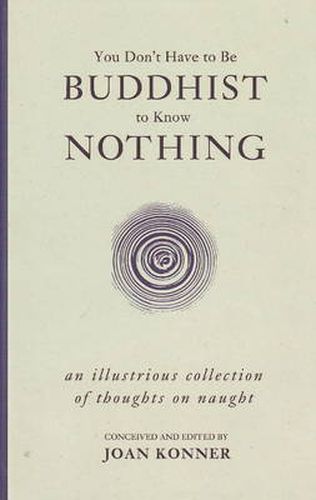Readings Newsletter
Become a Readings Member to make your shopping experience even easier.
Sign in or sign up for free!
You’re not far away from qualifying for FREE standard shipping within Australia
You’ve qualified for FREE standard shipping within Australia
The cart is loading…






Whether a subject of dread or of fascination, nothing (often spelled with a capital ‘N’) has intrigued writers, philosophers, and scientists since ancient times. In this sound-bite history of the concept of nothing, distinguished journalist Joan Konner has created a unique anthology devoted to, well …nothing. The collection brings together, in one portable volume, the thoughts of well-known writers and philosophers, artists and musicians, poets and playwrights, geniuses and jokers, demonstrating that some of the finest minds explored, feared, confronted, experienced, and played with the real or imagined presence of nothing in their lives. Paradoxical? Yes, indeed. This book shows that, like many Eastern sages, deep thinkers in the West also recognised and pondered non-existence as an essential component and complement of existence itself. Organised in short topical chapters from ‘Knowing Nothing’ to the ‘Joy of Unknowing’ and ‘Nothing is Sacred’, the verbal snapshots captured in this collection create a coherent work of insight, wisdom, humour and wonder. The book is compelling enough to be read all at once or in short bursts, as the spirit moves.
$9.00 standard shipping within Australia
FREE standard shipping within Australia for orders over $100.00
Express & International shipping calculated at checkout
Whether a subject of dread or of fascination, nothing (often spelled with a capital ‘N’) has intrigued writers, philosophers, and scientists since ancient times. In this sound-bite history of the concept of nothing, distinguished journalist Joan Konner has created a unique anthology devoted to, well …nothing. The collection brings together, in one portable volume, the thoughts of well-known writers and philosophers, artists and musicians, poets and playwrights, geniuses and jokers, demonstrating that some of the finest minds explored, feared, confronted, experienced, and played with the real or imagined presence of nothing in their lives. Paradoxical? Yes, indeed. This book shows that, like many Eastern sages, deep thinkers in the West also recognised and pondered non-existence as an essential component and complement of existence itself. Organised in short topical chapters from ‘Knowing Nothing’ to the ‘Joy of Unknowing’ and ‘Nothing is Sacred’, the verbal snapshots captured in this collection create a coherent work of insight, wisdom, humour and wonder. The book is compelling enough to be read all at once or in short bursts, as the spirit moves.